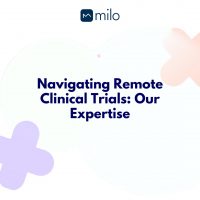The currency of remote clinical trials rise significantly after the COVID-19 pandemic. The method provides a practical solution for overcoming challenges proposed by traditional systems, like slow recruitment rates and extended data management processes. Milo Healthcare is specialized in handling complexities that come with remote clinical trials such as virtual patient recruiting, decentralized testing, and collecting off-site research information.
We acknowledge the significance of adapting innovative approaches to ensure compliance and safety while utilizing digital technologies including telemedicine along with remotely monitoring patients’ health conditions throughout their participation in studies.
Our platform offers essential resources necessary for conducting successful remote clinical trials comprehensive support services required during all phases from start-up through closing activities ensuring study initiation runs horizontally until successfully completed analysis ready deliverables are delivered.
Advantages of Conducting Clinical Trials Remotely
Compared to traditional trials, remote clinical studies provide several advantages. They enable virtual incorporation of clinical investigations and internet-based research which increases the facility of finding and engaging participants. Telemedicine surveys make it possible for patients from rural or inaccessible locations to be easily involved.
The on-going tracking of remote subjects permits instant accumulation and careful examination of data while reducing participant load consequently enhancing efficiency in significantly way. With their ability to conduct ongoing trials remotely, researchers can draw upon a more diverse patient population accordingly overcome infrastructure impediments as well as recruitment challenges leading towards success in these types of experiments overall.
Tackling Challenges in Traditional Clinical Studies
Various obstacles trouble conventional clinical research such as inadequate participant enrollment and a prolonged management procedure for data. The inadequacy of trial frameworks obstructs not only sponsors and contract research organizations, but medical examiners, human resources, and patients alike.
We recognize the importance of addressing these obstacles and enhancing the efficacy and efficiency of clinical trials through Milo Healthcare. With our proficiency in remote clinical trials, we provide a solution that simplifies recruitment procedures, fortify data management systems, and maximize intervention delivery.
Recruitment Optimization
Overcoming the difficulty of low recruitment rates is crucial to prevent significant delays in clinical trials, by that means impeding medical research progress.
To get work at this issue, we rely on modern digital techniques and inventive practices that enable us to excel geographical limitations and expand participant enrolments.
The use of innovative online platforms, social media networks and data mining methods successfully allow for greater outreach across a wider patient demography leading to increase enrollment numbers.
Data Management with High Efficiency
The traditional approach to clinical research involves a very long data management process, which often results in considerable delays and heightened error risks.
With Milo Healthcare, we take advantage of innovative technologies and advanced data management systems to streamline the collection, storage, and analysis of trial-related information.
By using secure electronic platforms instead of manual entry methods, we reduce errors while maintaining the integrity of our findings through every stage of research.
Optimizing the Delivery of Interventions
Our remote clinical trial expertise seeks to overcome the complexities and time constraints of traditional trials that could cause delays or protocol deviations during intervention delivery.
By leveraging digital technologies, we incorporate tele-healthcare services, real-time patient monitoring, and virtual visits into our approach for optimized intervention implementation.
With this method in place, participants can receive convenient access to healthcare while maintaining strict adherence to research protocols seamlessly.
Here at Milo Healthcare, we are devoted to transforming the clinical trial landscape, boosting patient outcomes, and propelling medical research through three key methods; simplifying recruitment procedures, optimizing data management strategies, and improving intervention delivery.
By executing these measures effectively in our operations process, researchers can tackle conventional research obstacles head-on with greater authority.
Remote Clinical Trials: A Look at Technology Innovations
In remote clinical trials, the use of various technologies is essential for effective implementation.
These technological tools play a pivotal role in streamlining processes, fostering participant involvement, and safeguarding data accuracy.
Read on to discover some critical technology components used in conducting remote clinical trials:
Monitoring of Patients from Distance
Real-time data collection and monitoring of patients is made possible through remote patient monitoring. Participants can utilize wearable devices to track and share vital signs, symptoms, as well as health-related information with researchers. Moreover, this technology provides continuous remote surveillance that boosts the safety and compliance of trial participants during clinical testing sessions.
Enrollment and Recruitment in the Digital Age
The recruitment of participants for clinical trials has been revolutionized by digital tools, which have aided in enrollment.
Researchers can utilize social media and data mining techniques to broaden their outreach channels, target a larger audience and speed up the enrolment process.
Such technology brings efficacy and convenience to participant acquisition during remote clinical research endeavors.
e-Consent: A Modern approach to Patient Authorization
Acquiring informed consent from participants is an essential measure for any clinical trial. E-consent, which permits electronic review and signature of consent forms by the participants, streamlines this process. By guaranteeing secure and expedient acquisition of consents, it makes administrative duties easier while improving participant experience.
Gathering information using biomarkers and biosensors
Biomarkers and biosensors facilitate the acquisition of significant knowledge regarding participants’ health and treatment outcomes. These technologies permit the gathering of verifiable data, including physiological metrics, genetic facts, and biochemical markers. The use of biomarkers and biosensor tools enables researchers to conveniently amass detailed information remotely; consequently, enhancing clinical studies’ scientific credibility through accuracy and comprehensiveness.
Strategic Approach on Risk-Based Monitoring
The integrity of the clinical trial process is ensured by risk-based monitoring, which employs a targeted approach to reduce on-site overload and focus resources in high-risk areas. The utilization of data-driven analysis and centralized monitoring tools enables researchers to effectively identify and reduce risks resulting in cost-effective trials with increased efficiency.
Access and Inclusivity with Telemedicine
The utilization of remote clinical trials permits healthcare provisions beyond the clinical environment and assessments for those in research studies. Remote consultations with medical experts, receiving health advice from a distance, and reporting treatment reactions or symptoms are viable thanks to telemedicine platforms. This kind of technology makes participant experience better for remote phases of tests while free access to medicine facilities at patients’ convenience.
Virtual clinical trials enable the observation of participants in their natural surroundings, facilitating a more precise assessment of treatment efficacy. Data collection passively minimizes reporting errors and reduces interference with participant input, enhancing findings quality.
The implementation of virtual clinical trials is an advantage by promoting participant diversity during recruitment. With remote testing available, it is possible to reach a more extensive pool of patients and overcome geographical limitations that may have delayed their prior involvement due to distance or logistical. This creates an inclusive study population that embraces individuals who were once excluded from participating opportunities, resulting in better representation across all groups involved.
Concluding remarks
Decentralized trials, along with other forms of remote clinical research, present a viable solution to the obstacles encountered within conventional trial systems. Through exploring digital tools and novel strategies for participant enrollment, data acquisition, and intervention administration, we can enhance both efficiency and efficacy in conducting such studies. In conclusion, decentralized clinics are indeed an effective way forward when it comes to improving upon traditional methodologies for carrying out clinical investigations in general practice today!
Although fully virtual trials may have restriction and are best suited for certain situations, such as drugs with well-defined side effects, hybrid clinical trials that blend elements of remote and traditional methods will likely become increasingly prevalent. By incorporating both approaches, these hybrid trials can leverage the advantages of remote assessments while also accommodating intricate protocols and specialized investigations.
Through hybrid study designs, we can make the most of decentralized trials and conventional clinical trial configurations to promote progression in medical research and enhance patient outcomes.
FAQ
What do remote clinical trials refer to?
Remote clinical trials use digital tools and remote methods, such as online research, virtual patient recruitment, and telemedicine testing. These studies enable participants to take part from their homes or accessible healthcare facilities for convenience purposes.
What advantages do remote clinical trials offer?
There are numerous benefits to remote clinical trials in comparison to conventional ones. They provide more convenient means of accessing and enrolling participants by utilizing virtual clinical studies and online research methods. Telemedicine experiments enhance patient accessibility, particularly for those living in distant or rural regions. Real-time data collection enabled via remote patient monitoring lessens the burden on subjects and improves efficiency levels. Researchers can achieve greater diversity among their study population while overcoming issues related to infrastructure limitations and participant recruitment challenges by conducting trials remotely instead thereof requiring an onsite visit from each subject involved as previously established.
What are the difficulties encountered by conventional clinical trials?
The low recruitment rates and extensive data management process often posed challenges for traditional clinical trials, affecting sponsors, contract research organizations, site staff, investigators, and patients.
However, with digital technologies aiding remote clinical trials it can resolve these inefficiencies through optimized recruitment processes along with streamlined data collection and intervention delivery methods.
Which technologies aid in conducting clinical trials remotely?
To facilitate remote clinical trials, many technologies are employed such as remote patient monitoring for collecting real-time data and overseeing participant progress. Additionally, digital recruitment and enrollment tools enhance the range of channels used to recruit participants while electronic consent serves an efficient method of obtaining informed consent in a secured manner. Gathering valuable health insights through biomarkers and biosensors is also possible while risk-based monitoring maintains trial integrity. Further support is provided by real-time location tracking systems which enable equipment and individual identification along with tele-healthcare options allowing for healthcare delivery assessments regardless of location restrictions.
What advantages do virtual clinical trials offer?
By providing a real-world context, virtual clinical trials boost the accuracy of treatment outcome assessment while monitoring participants in their natural environment. Passive data collection reduces manual input and leads to better quality data with fewer reporting errors. Additionally, these types of studies promote diversity by enabling access for patients from varied locations and backgrounds.
Why are hybrid clinical trials significant?
Hybrid clinical trials combine traditional and remote approaches, utilizing the advantages of decentralized studies along with conventional trial designs. While completely virtual trials are acceptable only for specific sceneries, hybrid methodologies facilitate complex procedures and specialized investigations. Implementing hybrid study models enhances the proficiency and efficacy of clinical research, although it also drives medical advancements to provide better patient outcomes.







